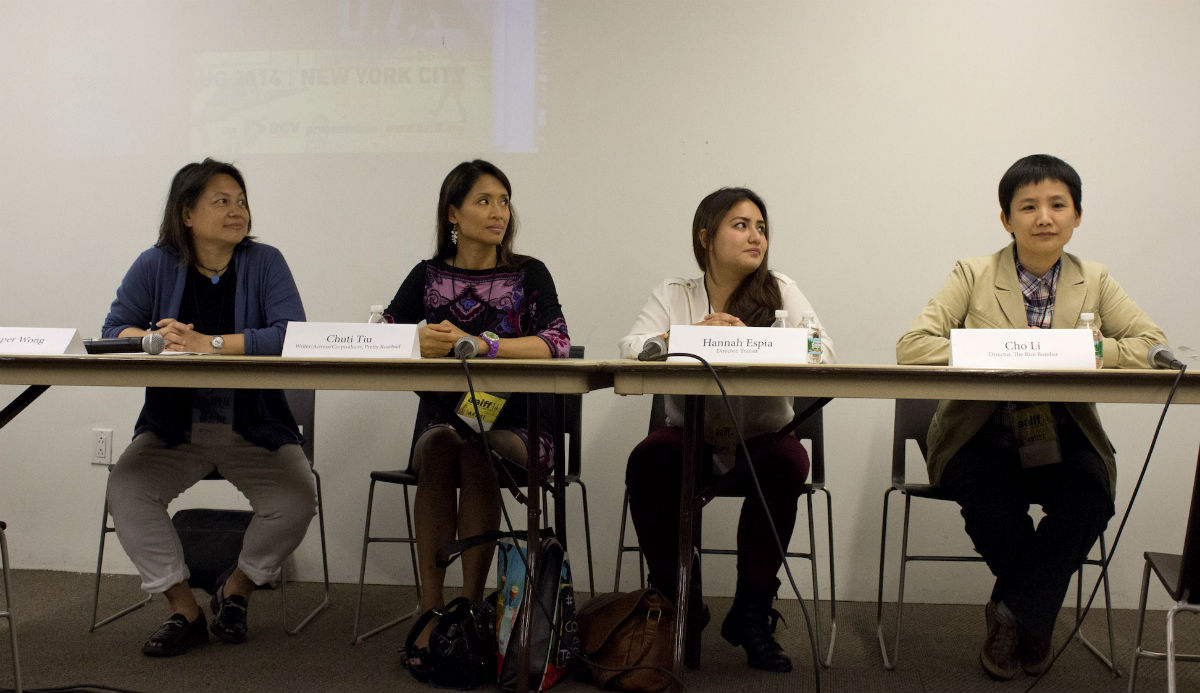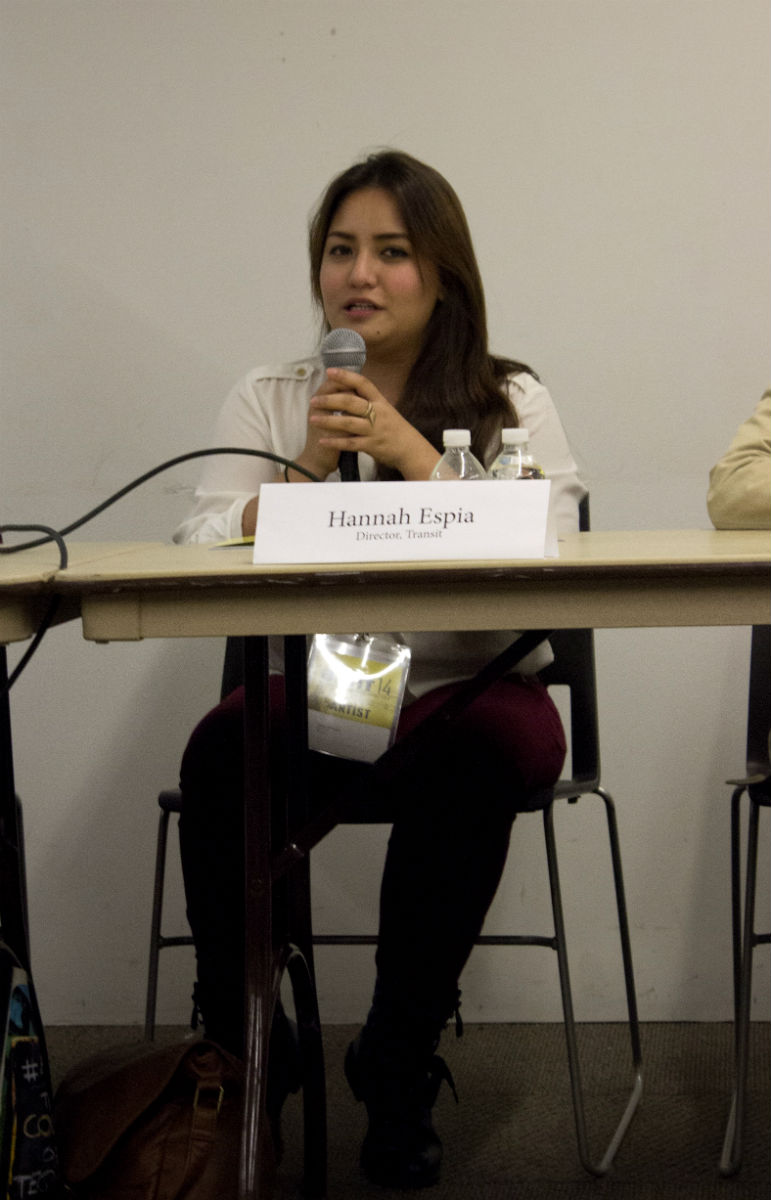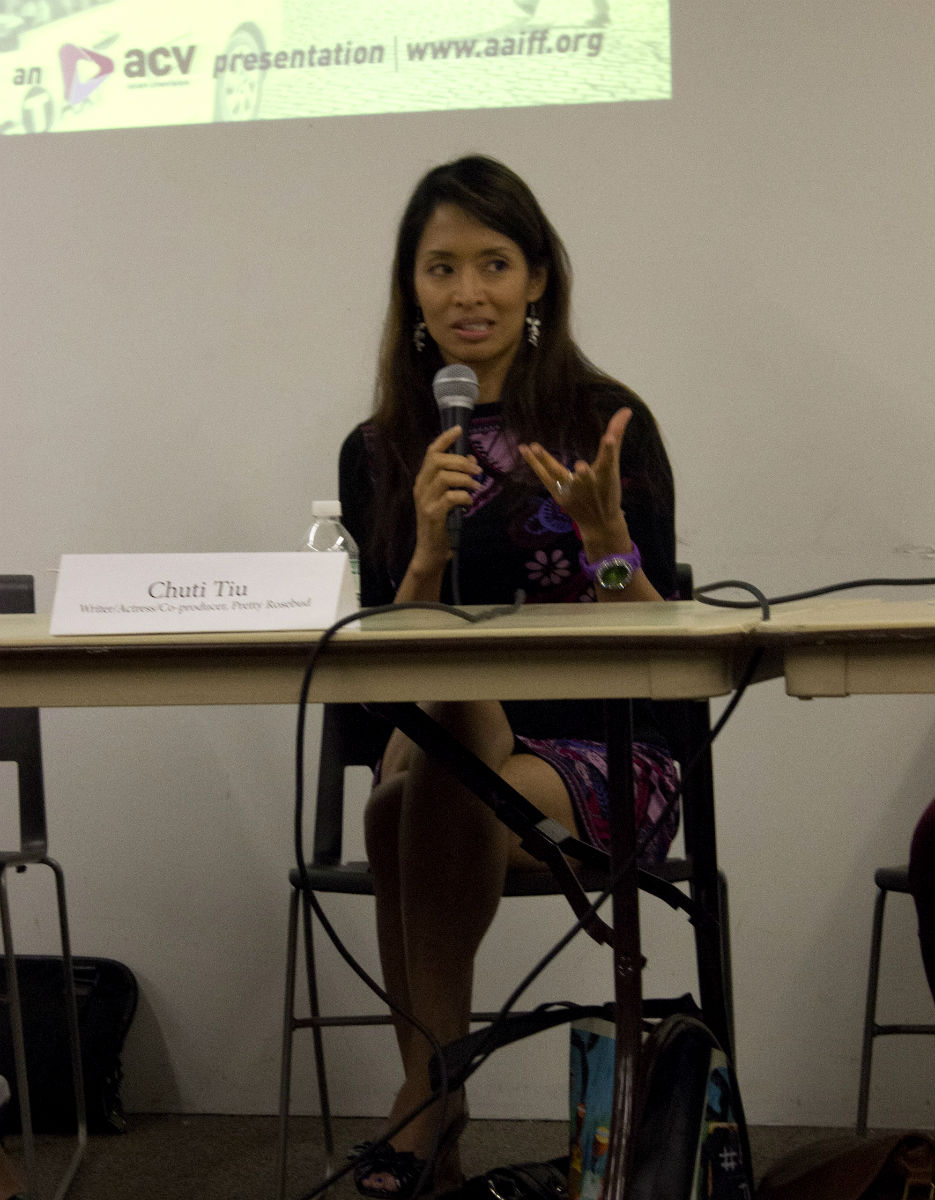By Joy Chiang Ling
On July 25th, three female filmmakers were present at a panel for the Asian American International Film Festival. The panel speakers included Chuti Tiu, writer for Pretty Rosebud, Hana Espia, director and writer of Transit, and Cho Li, director of The Rice Bomber. Each filmmaker introduced their respective films and provided some background about its production, before opening up their discussion to a Q&A with the audience. The panel was moderated by AAIFF alum, filmmaker S. Casper Wong.
The first person to introduce her film was Hannah Espia. Espia’s family owns a tour agency that allows her to travel around the world. She was inspired to create Transit after seeing a Filipino man with his young son on a tour in Israel. She then assembled a production crew which consisted of her professor and classmates. Together, they spent two weeks in Israel after being given permission to film by the Israeli Embassy in Manila. Shooting the film took only nine days. The actors also had to learn Hebrew specifically for the film – which took them an astonishing six weeks! Espia also used real Filipino migrant workers in the film to talk about their experiences.
The second filmmaker to introduce herself was Cho Li. Her film, The Rice Bomber, was inspired by a true social incident that occurred between the years 2003 and 2004. The protagonist, Yang Rumen, was Taiwan’s first ever peasant activist. Both Cho Li and Yang Rumen come from the same hometown – Changhua county in central Taiwan. Because of this, the director felt connected to the story because she was able to relate to the people involved in the situation.
The third and last filmmaker to introduce herself was Chuti Tiu, whose film, Pretty Rosebud, is “30% autobiographical” and “70% imagined.” It is a film about breaking tradition. It follows the story of a housewife who wants to liberate herself from her unfaithful husband and strict, traditional family. It addresses the pressure and conflicts involved with the “tightly wound definition of family and family roles.” The film was inspired by Tiu’s stressful marriage and the pressures she faced from her parents. Chuti hopes that the film will help people who are going through similar situations.
One of the first questions posed by the audience was, “Did you face any challenges funding the film? Did your gender also contribute to any of the challenges you may have faced?”
Chuti Tiu was the first to answer. She stated that her husband helped direct Pretty Rosebud. The locations were free, as they did not require any permits. There was lots of cost-cutting because it was difficult to get people to help fund the film. People were doubtful of its success because it was not a commercial film, and that the subject matter was not very popular. Thus, the film was funded mostly through private investments. Tiu also noted that women and people of color were more likely to be supportive and understand the struggles that were portrayed in the film.
Hannah stated that the Philippines privately supports young filmmakers. She was given an Indie film festival grant, and also participated in the Manila Film Financing Forum. One producer from the forum fell in love with the story and helped fund the film. Her family’s tour company also proved to be very advantageous. They helped provide location permits and film equipment. One US producer that she met claimed that her movie’s budget was “their budget for catering!”
Another question that a member of the audience asked was, “Did you run into any problems with censors?”
Cho Li responded that Taiwan does not censor its films, but when she asked the police department to help with the technical aspects of her film, they were reluctant because of the shame and history they shared with the real Yang Rumen. They merely responded, “deal with it” and did not want to be involved with The Rice Bomber.
Hannah and Chuti, meanwhile, did not face any problems with censors. Chuti did mention, however, that her parents were not pleased with certain aspects of the film and suggested revisions, to which Chuti did not follow through.
One other question concerned a more social topic: “What are the advantages of being a female filmmaker?”
Cho Li admitted that she did not have many attractive physical qualities that would be of advantage to her. She states that she is well-balanced and not too emotional, but she had some advantage with communicating with male colleagues.
Hannah, on the other hand, jokingly revealed that she was given “five minute cry breaks.” She also feels that audiences are more curious to analyze a woman’s perspective in film.
Chuti went out of her way to include more female crew members on the set. She feels that women bring a unique energy and perspective to a film. She also felt that because a woman’s presence is less intimidating, she was able to communicate with people more easily.
After that, a pretty powerful question was asked: “How do you think Asian cinema will change? What will be your role in it?”
Chuti felt that Asian filmmakers need more support and exposure. The more people watch their films, the more projects that will be made.
Hannah sees a slow but sure increase in young female filmmakers. She also noted that many female filmmakers are discouraged because of pressures from marriage and family.
Cho Li, meanwhile, did not see an issue with female filmmakers in the Taiwanese film industry. It surprised her that many women feel the way Hannah and Chuti do. She also stated that male filmmakers are also discouraged by marriage and family issues.
Continuing with the topic, another person from the audience asked, “What is the most obvious difference between male and female perspectives in filmmaking?”
Cho Li felt that her films are very gender neutral. People would not expect her films to be made by a female. She hopes that audiences would watch films without considering the identity of the filmmaker.
Hannah believes that her film is a very feminine film due to its majority-female cast. Other people have noted that even the male characters in the story, such as the father, Moises, take on feminine roles.
Chuti feels that her film is told from a uniquely female perspective. She also revealed that looking for a director for her film was hard because many people judged her character negatively. It depends on a person’s sensibilities, and everyone has something to contribute.
The final question was, “How did you all choose to pursue filmmaking as a career?”
Cho Li always wanted to be a filmmaker. She did not originally want to be a director, however. Back in Taiwan, a local opera inspired her. She also watched a lot of foreign films in high school.
Hannah was always interested in films because she grew up loving it. In fact, her parents named her after a character in a Woody Allen movie titled Hannah and Her Sisters. She also enjoys film because she feels that it combines every art – music, acting, illustration, etc.
Chuti originally wanted to be the first female president. But after realizing that she did not like politics, she gave up on that dream but still wanted to find a way to impact people’s hearts. She chose filmmaking because she believes that it is an effective way to inspire people.




Leave a Reply